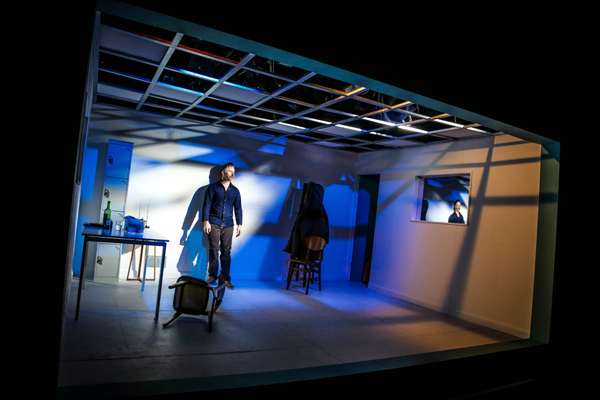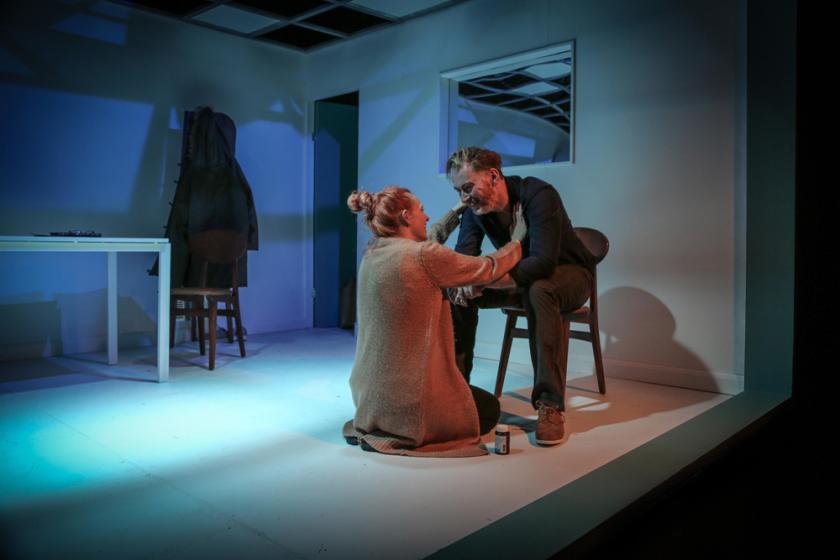Titles don’t come much more evocative than this: Valhalla, the gigantic hall in Odin’s Asgard where those slain in battle come to feast, is the Norse mythological version of the Islamist fantasy of eternal life for jihadist martyrs. Valhalla brings to mind the sound of Wagnerian horns and the sights of vast mountain peaks. It’s all very Nordic, very Aryan and very Tolkien. And it’s the setting for playwright Paul Murphy’s excellent new play about scientific ethics, an 80-minute two-hander which is co-winner, with Bea Roberts’s similary great And Then Come the Nightjars, of this new-writing venue’s inaugural international Playwriting Award.
The story starts quietly enough. We are introduced to Man, a genetic scientist who is researching a cure for a virulent flu epidemic which is killing thousands, and to his wife, Woman, who works as a GP. They are trying for a baby, but she is having trouble conceiving. In the wider world, the epidemic has resulted in riots in the streets, and her practice has been attacked by people looking for drugs. To escape these strains, the couple decide to go to an unspecified Nordic research facility, where Man can continue his work.
Theatre 503 has come up with
a real winner
Finding themselves in an environment where they are virtually alone, Man and Woman realise that all is not well in their marriage. Suddenly deprived of all their familiar friends and relations, their loneliness becomes a strong metaphor for the human condition. Murphy’s playtext has an epigraph from Wittgenstein – “The human body is the best picture of the human soul” – and our couple explore their relationship through a series of rapid scenes that often expose the body: its strengths, its fragility, its secrets and its genetic coding.
As Woman gradually realises the truth about her husband’s researches, the play suggests some troubling questions about medical science. When people’s lives depend on your work, what practices are acceptable? And what is ethically unacceptable? Does the end never justify the means? But this bland summary only tells half the story. As this modern marriage – with its sensitive, questioning Woman and rather secretive, controlling Man – begins to crack, another reality insinuates itself into this chilly fastness.
Just as the Northern Lights light up the horizon, the wife meets a local woman, named after the Scandinavian goddess Freya. Outside the couple’s clean and sterile living space, there is a faint sound of distant arctic foxes, blue lights and tales of witches and their spells. Fertility gods grumble in the early dark. Woman is attracted to these local legends, and they add shade and shadow to the more mundane marital arguments. While Man is into control and command, Woman is drawn to ancient spells and the knowledge that women have traditionally handed down to each other. Behind the contemporary world is a universe of archaic incantation. Trolls scamper across the mountains.
 Valhalla is brilliantly written. Murphy perfectly balances the personal and political, and each scene explores the binary opposites of male and female, science and magic, reason and intuition, truth and secrets; life embraces death, creativity bumps into destruction, and love turns into antagonism. What’s so acutely captured is the suspicion that has infected this marriage, and how personal character affects work, and vice versa. Each episode in this fast-moving story ends on an explosive note. Occasionally shocking, often uncomfortable, the play is also thoroughly enjoyable and thought-provoking.
Valhalla is brilliantly written. Murphy perfectly balances the personal and political, and each scene explores the binary opposites of male and female, science and magic, reason and intuition, truth and secrets; life embraces death, creativity bumps into destruction, and love turns into antagonism. What’s so acutely captured is the suspicion that has infected this marriage, and how personal character affects work, and vice versa. Each episode in this fast-moving story ends on an explosive note. Occasionally shocking, often uncomfortable, the play is also thoroughly enjoyable and thought-provoking.
A sharp tang of ambiguity runs through the plot, which is both compelling and thrilling. Jo McInnes’s vivid and provocative production, on designer Katie Lias’s versatile set (pictured above), has also overcome a potentially disastrous situation, when the actor originally billed to play Man had to withdraw at the last minute. Luckily playwright Murphy is a RADA-trained actor, and he has stepped up to the plate, giving a brave performance as the gruff and controlling Man opposite Carolina Main’s superbly convincing Woman. Their interaction is taut and often feels dangerous, with intimate secrets facing up to the glare of truth. If – despite a dazzling final coup de théâtre – the last couple of scenes are staged with a touch too much ambiguity, this is still a great evening. It will haunt you. Once again, Theatre 503 has come up with a real winner.















Add comment